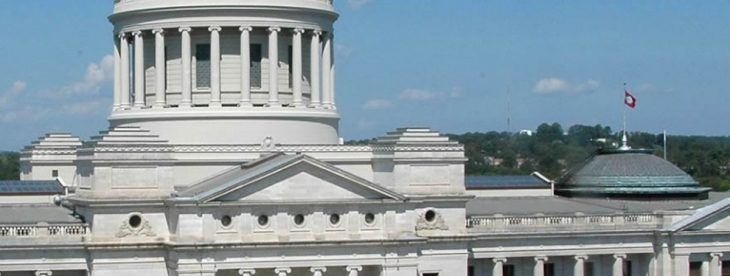Tax cuts: Arkansas legislators more hesitant, but something will get through
by October 6, 2016 2:48 pm 256 views

Gov. Asa Hutchinson has said he wants a second round of tax cuts in the 2017 legislative session, but some legislators are more cautious in the wake of three straight months where revenues did not meet expectations.
“I think the jury’s still out,” said Sen. Jake Files, R-Fort Smith, chairman of the Senate Revenue and Tax Committee. “There’s a lot of talk about wanting them and a lot of will to have them, but I think we’ve got to go in with some responsibility and caution – especially with the last three months of revenues not hitting forecast, I feel like it’s prudent for us to tread carefully and make sure we can afford what we’re projecting.”
The Department of Finance and Administration reported this week that net available general revenues of $515.5 million in September were $500,000 below last year and $16.7 million below forecast – the third straight month in fiscal 2017 that revenues did not meet expectations.
A $100 million tax cut was among the first orders of business in the 2015 session. Hutchinson had made it a central campaign promise and was elected with a large majority. Files said legislators were glad to go along with the new governor. This time, he said, while some kind of tax cut will be passed, there will “need to be more fact-finding and evidence-based methodology.”
“I don’t think that will be the case this time, and not because they all of a sudden have animosity toward the governor and don’t support tax cuts,” he said. “I just think there’ll be more things that have to happen to get from point A to point B.”
Files said legislators aren’t necessarily focused on any particular challenge with the state budget but have more of a general concern.
“It’s mainly been more of a global, we need to make sure we can afford this,” he said. “We cut taxes last session at the beginning of the session and then made all the numbers work, and I don’t see there being a lot of will to do that again.”
But Sen. Bart Hester, R-Cave Springs, disagrees, saying the state has money from the previous year’s surplus, and tax cuts – at least $100 million as a baseline – again should come first. Otherwise, the government will just spend the money.
“If you do the tax cuts early like we did last session, then you grow government programs by what you have left,” he said. “I think you have to take care of the taxpayer first. Then you look at what programs you want to fund.”
Hutchinson’s spokesman, J.R. Davis, said the governor has always said he wants tax cuts to be done responsibly.
“The governor’s goal is to continue to lower the income tax rate in Arkansas so we can be competitive among our neighboring states, and he’s going to do it in a responsible manner,” he said.
Legislators face a number of challenges in cutting taxes. Spending for K-12 public education, the largest item in the state’s general revenue budget, almost certainly will not be cut lest the state find itself in court, as it was for much of the 1990s and 2000s in the Lake View case. Members of the House and Senate Education committees are meeting this month to write the adequacy report that will form the foundation for school spending.
Meanwhile, health care costs continue to rise. More Arkansans than expected are participating in the private option, the program that purchases insurance for lower-income residents, and the state begins paying 5% of the cost next year. Overall Medicaid rates are increasing. Sen. Jim Hendren, R-Gravette, is chairman of a legislative task force looking for savings in Medicaid.
“What we’re fighting about is, is it going to be a 5% increase or a 7% increase for health care?” he said.
According to Hendren, news of three consecutive months of tax revenue declines changes the equation, requiring spending cuts to be identified along with the tax cuts. Unless something changes, he said tax cuts are “not going to be to me as easy as it was last time.”
But Hester is not as spooked by the recent downturn in revenue collections.
“I’ve been around for four years now, and what I’ve seen is the DFA’s projections are poor leading into session, certainly leading into budget hearing,” he said. “They’re poor throughout session. As soon as we get out of session, that all of a sudden that there’s a miraculous recovery and there’s plenty of money. Now, I don’t think that’s a bad strategy, because we will spend all that we have as legislators.”
Hester said that while the 2015 session rightfully focused on the middle class, this one should be broad-based. Files suggested the state enact triggered tax cuts that would take effect only if revenues meet a certain amount. He’d like to see tax cuts targeted toward lower-income taxpayers, such as an earned income tax credit. Meanwhile, spending cuts need to accompany tax cuts.
“There’s a whole lot of talk about cutting government and doing things that bring us back under control, but there’s typically very little done in those regards,” he said. “And I think if we continue to talk about it and campaign on it, we need to do something, or we need to change talking points.”
All three legislators agreed that, ultimately, some kind of tax cut likely will happen. Hester said colleagues’ hesitance will be overcome.
“Maybe right now the enthusiasm isn’t there, but I assure you when we get into session, the enthusiasm will be there,” he said.
